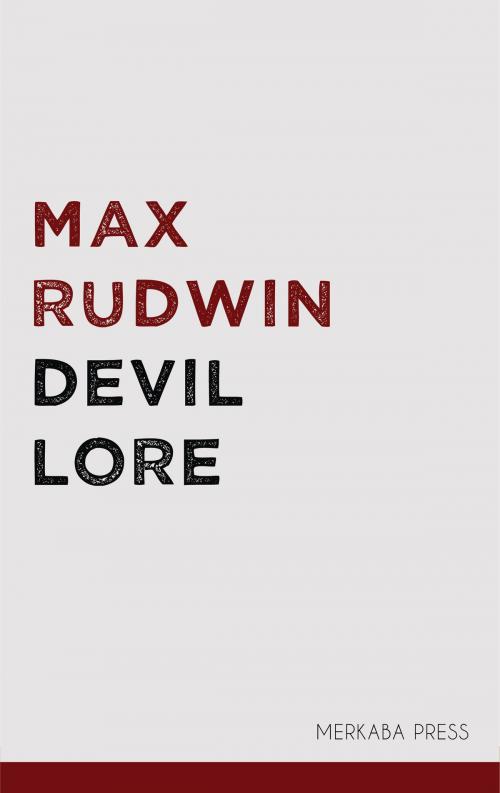| Author: | Max Rudwin | ISBN: | 6610000023936 |
| Publisher: | PublishDrive | Publication: | July 27, 2017 |
| Imprint: | Merkaba Press | Language: | English |
| Author: | Max Rudwin |
| ISBN: | 6610000023936 |
| Publisher: | PublishDrive |
| Publication: | July 27, 2017 |
| Imprint: | Merkaba Press |
| Language: | English |
Of all the myths which have come down to us from the East, and of all the creations of Western fancy and belief, the Personality of Evil has had the strongest attraction for the mind of man. The Devil is the greatest enigma that has ever confronted the human intelligence. So large a place has Satan taken in our imagination, and we might also say in our heart, that his expulsion therefrom, no matter what philosophy may teach us, must for ever remain an impossibility. As a character in imaginative literature Lucifer has not his equal in heaven above or on the earth beneath. In contrast to the idea of Good, which is the more exalted in proportion to its freedom from anthropomorphism, the idea of Evil owes to the presence of this element its chief value as a poetic theme. The discrowned archangel may have been inferior to St. Michael in military tactics, but he certainly is his superior in matters literary. The fair angels—all frankness and goodness—are beyond our comprehension, but the fallen angels, with all their faults and sufferings, are kin to us.
There is a legend that the Devil has always had literary aspirations. The German theosophist Jacob Böhme relates that when Satan was asked to explain the cause of God’s enmity to him and his consequent downfall, he replied: “I wanted to be an author.” Whether or not the Devil has ever written anything over his own signature, he has certainly helped others compose their greatest works. It is a significant fact that the greatest imaginations have discerned an attraction in Diabolus. What would the world’s literature be if from it we eliminated Dante’s Divine Comedy, Calderón’s Marvellous Magician, Milton’s Paradise Lost, Goethe’s Faust, Byron’s Cain, Vigny’s Eloa, and Lermontov’s Demon? Sorry indeed would have been the plight of literature without a judicious admixture of the Diabolical. Without the Devil there would simply be no literature, because without his intervention there would be no plot, and without a plot the story of the world would lose its interest. Even now, when the belief in the Devil has gone out of fashion, and when the very mention of his name, far from causing men to cross themselves, brings a smile to their faces, Satan has continued to be a puissant personage in the realm of letters. As a matter of fact, Beelzebub has perhaps received his greatest elaboration at the hands of writers who believed in him just as little as Shakespeare did in the ghost of Hamlet’s father.
Of all the myths which have come down to us from the East, and of all the creations of Western fancy and belief, the Personality of Evil has had the strongest attraction for the mind of man. The Devil is the greatest enigma that has ever confronted the human intelligence. So large a place has Satan taken in our imagination, and we might also say in our heart, that his expulsion therefrom, no matter what philosophy may teach us, must for ever remain an impossibility. As a character in imaginative literature Lucifer has not his equal in heaven above or on the earth beneath. In contrast to the idea of Good, which is the more exalted in proportion to its freedom from anthropomorphism, the idea of Evil owes to the presence of this element its chief value as a poetic theme. The discrowned archangel may have been inferior to St. Michael in military tactics, but he certainly is his superior in matters literary. The fair angels—all frankness and goodness—are beyond our comprehension, but the fallen angels, with all their faults and sufferings, are kin to us.
There is a legend that the Devil has always had literary aspirations. The German theosophist Jacob Böhme relates that when Satan was asked to explain the cause of God’s enmity to him and his consequent downfall, he replied: “I wanted to be an author.” Whether or not the Devil has ever written anything over his own signature, he has certainly helped others compose their greatest works. It is a significant fact that the greatest imaginations have discerned an attraction in Diabolus. What would the world’s literature be if from it we eliminated Dante’s Divine Comedy, Calderón’s Marvellous Magician, Milton’s Paradise Lost, Goethe’s Faust, Byron’s Cain, Vigny’s Eloa, and Lermontov’s Demon? Sorry indeed would have been the plight of literature without a judicious admixture of the Diabolical. Without the Devil there would simply be no literature, because without his intervention there would be no plot, and without a plot the story of the world would lose its interest. Even now, when the belief in the Devil has gone out of fashion, and when the very mention of his name, far from causing men to cross themselves, brings a smile to their faces, Satan has continued to be a puissant personage in the realm of letters. As a matter of fact, Beelzebub has perhaps received his greatest elaboration at the hands of writers who believed in him just as little as Shakespeare did in the ghost of Hamlet’s father.















